
On this page, we have provided all the information about DEA and Education that may be interesting and useful to users. This page contains the following sections:
1. Background
2. Key papers
3. New interesting papers
4. Related subject
5. Statistics
6. References
Highlights:
A classification of the articles by year reveals that the greatest number of articles in DEA and education was published in 2016.
• Economics of Education Review, Socio-Economic Planning Sciences, and European Journal of Operational Research are the journals that have published the greatest number of DEA and education papers.
• Evaluation of Performance Based Appraisal System in Higher Education Sector using DEA and AHP.
• A Research Framework for Data Envelopment Analysis with Upper Bound on Output to Measure Efficiency Performance of Higher Learning Institution in Aceh Province.
• Performance of private higher education institutions in Vietnam: evidence using DEA-based bootstrap directional distance approach with quasi-fixed inputs.
BACKGROUND
Perhaps the best-known and earliest work in the area of measuring education production was conducted by Bessent (1982). Employing the well-known Charnes, Cooper and Rhodes (1978) constant returns-to-scale DEA model, they examined the productive efficiency of Houston’s 241 school districts. Bessent was one of the first studies to point out some advantages of DEA over previously used techniques. These included the incorporation of multiple outputs, the fact that a parametric functional form does not have to be specified for the production function, and the ability to identify sources of inefficiency for individual schools. In addition, Bessent enshrined the use of standardised test scores as the measure of educational attainment, incorporated issues relating to local, state and federal funding, and proxied the quality of teaching inputs with teaching experience, training and qualifications. Finally, Bessent cogently listed the major problems found in educational efficiency studies:
(1) obtaining data to specify adequate input measures, (2) obtaining data to specify outputs that were not limited to cognitive test results, and (3) difficulties in communicating the results of a complex quantitative process to those affected by the results.
KEYPAPERS
This section introduces key papers in the DEA and education. These papers have had a significant impact on the DEA and its application in education sector.
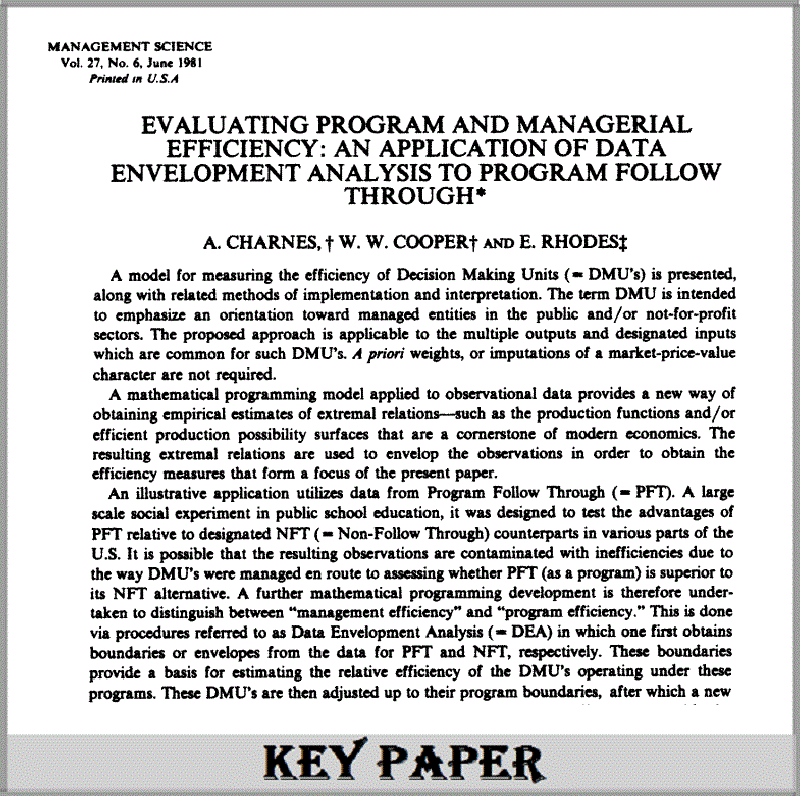
Evaluating program and managerial efficiency: An application of data envelopment analysis to Program Follow Through
Authors: Charnes, A., Cooper, W.W., and Rhodes, E.
Journal: Management Science
Published: 1981
Abstract: A model for measuring the efficiency of Decision Making Units (=DMU's) is presented, along with related methods of implementation and interpretation. The term DMU is intended to emphasize an orientation toward managed entities in the public and/or not-for-profit sectors. The proposed approach is applicable to the multiple outputs and designated inputs which are common for such DMU's. A priori weights, or imputations of a market-price-value character are not required. A mathematical programming model applied to observational data provides a new way of obtaining empirical estimates of extrernal relations—such as the production functions and/or efficient production possibility surfaces that are a cornerstone of modern economics. The resulting extremal relations are used to envelop the observations in order to obtain the efficiency measures that form a focus of the present paper. An illustrative application utilizes data from Program Follow Through (=PFT). A large scale social experiment in public school education, it was designed to test the advantages of PFT relative to designated NFT (=Non-Follow Through) counterparts in various parts of the U.S. It is possible that the resulting observations are contaminated with inefficiencies due to the way DMU's were managed en route to assessing whether PFT (as a program) is superior to its NFT alternative. A further mathematical programming development is therefore undertaken to distinguish between “management efficiency” and “program efficiency.” This is done via procedures referred to as Data Envelopment Analysis (=DEA) in which one first obtains boundaries or envelopes from the data for PFT and NFT, respectively. These boundaries provide a basis for estimating the relative efficiency of the DMU's operating under these programs. These DMU's are then adjusted up to their program boundaries, after which a new inter-program envelope is obtained for evaluating the PFT and NFT programs with the estimated managerial inefficiencies eliminated. The claimed superiority of PFT fails to be validated in this illustrative application. Our DEA approach, however, suggests the additional possibility of new approaches obtained from PFT-NFT combinations which may be superior to either of them alone. Validating such possibilities cannot be done only by statistical or other modelings. It requires recourse to field studies, including audits (e.g., of a U.S. General Accounting Office variety) and therefore ways in which the results of a DEA approach may be used to guide such further studies (or audits) are also indicated.
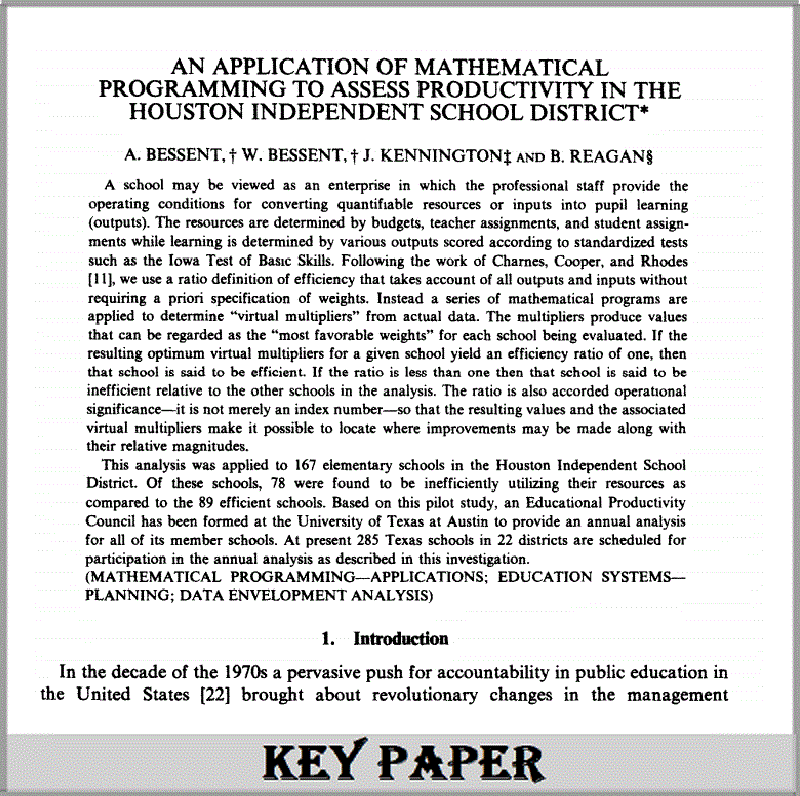
An application of mathematical programming to assess productivity in the Houston independent school district
Authors: Bessent, A., Bessent, W., Kennington, J & Reagan, B.
Journal: Management Science
Published: 1982
Abstract: A school may be viewed as an enterprise in which the professional staff provide the operating conditions for converting quantifiable resources or inputs into pupil learning (outputs). The resources are determined by budgets, teacher assignments, and student assignments while learning is determined by various outputs scored according to standardized tests such as the Iowa Test of Basic Skills. Following the work of Charnes, Cooper, and Rhodes (Charnes, A., W. W. Cooper, E. Rhodes. 1981. Evaluating program and managerial efficiency: an application of data envelopment analysis to program follow through. Management Sci.27 (6) 668–697.), we use a ratio definition of efficiency that takes account of all outputs and inputs without requiring a priori specification of weights. Instead a series of mathematical programs are applied to determine “virtual multipliers” from actual data. The multipliers produce values that can be regarded as the “most favorable weights” for each school being evaluated. If the resulting optimum virtual multipliers for a given school yield an efficiency ratio of one, then that school is said to be efficient. If the ratio is less than one then that school is said to be inefficient relative to the other schools in the analysis. The ratio is also accorded operational significance—it is not merely an index number—so that the resulting values and the associated virtual multipliers make it possible to locate where improvements may be made along with their relative magnitudes. This analysis was applied to 167 elementary schools in the Houston Independent School District. Of these schools, 78 were found to be inefficiently utilizing their resources as compared to the 89 efficient schools. Based on this pilot study, an Educational Productivity Council has been formed at the University of Texas at Austin to provide an annual analysis for all of its member schools. At present 285 Texas schools in 22 districts are scheduled for participation in the annual analysis as described in this investigation.
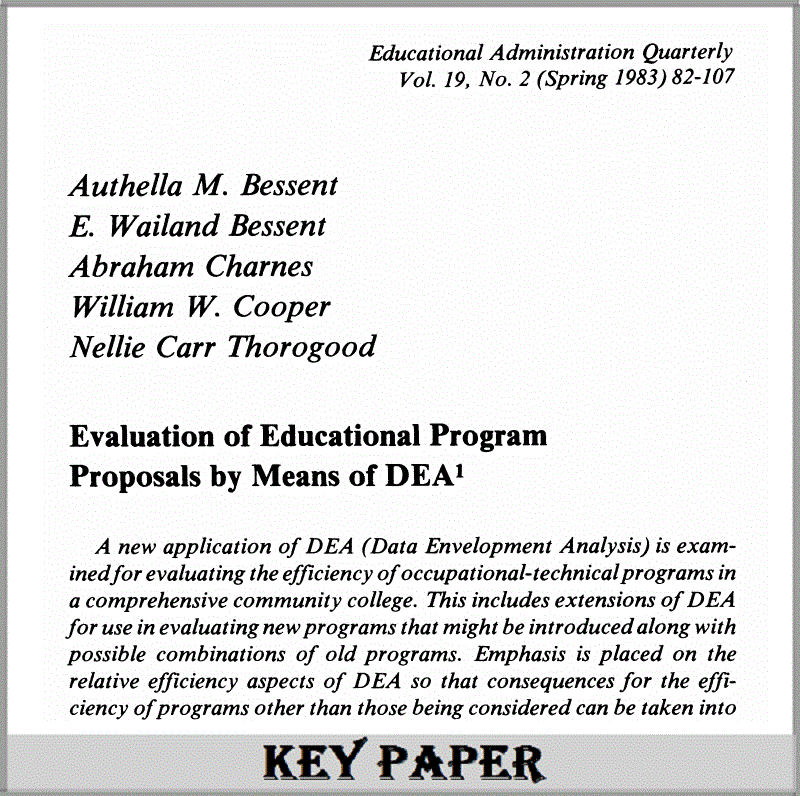
Evaluation of educational-program proposals by means of DEA
Authors: Bessent A.M., Bessent E.W., Charnes A, Cooper W.W., Thorogood N.C.
Journal: Educational Administration Quarterly
Published: 1983
Abstract: A new application of DEA (Data Envelopment Analysis) is examined for evaluating the efficiency of occupational-technical programs in a comprehensive community college. This includes extensions of DEA for use in evaluating new programs that might be introduced along with possible combinations of old programs. Emphasis is placed on the relative efficiency aspects of DEA so that consequences for the efficiency of programs other than those being considered can be taken into account. Uses by the director of San Antonio College are described and placed in a context of the other elements that entered into her decisions. In conclusion, possible further improvements in DEA are discussed along with the kinds of research needed to achieve them.
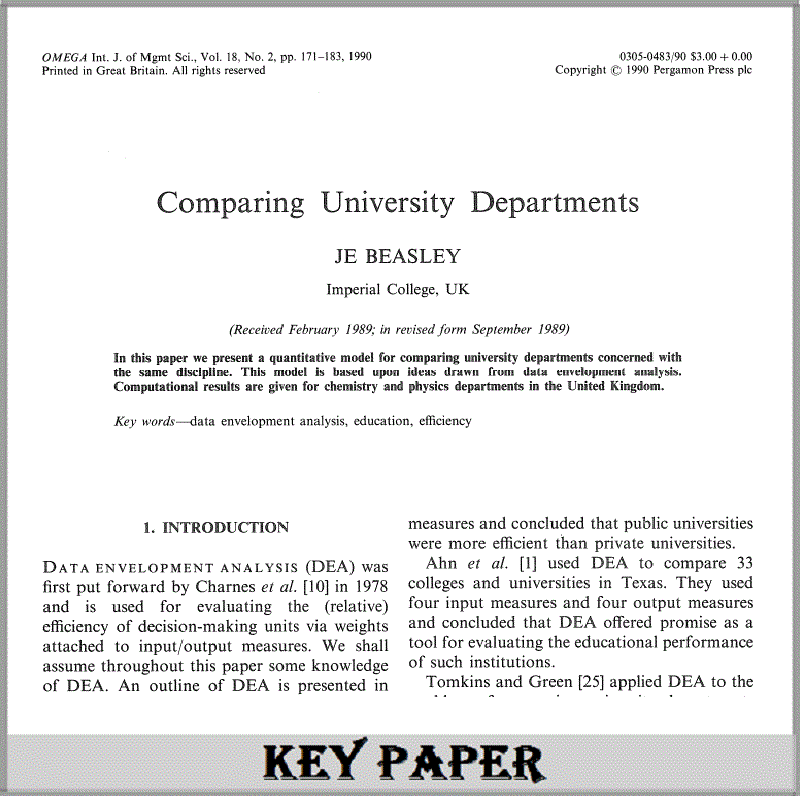
Comparing university departments
Author: Beasley, J. E.
Journal: OMEGA Journal of Management Science
Published: 1990
Abstract: In this paper we present a quantitative model for comparing university departments concerned with the same discipline. This model is based upon ideas drawn from data envelopment analysis. Computational results are given for chemistry and physics departments in the United Kingdom.
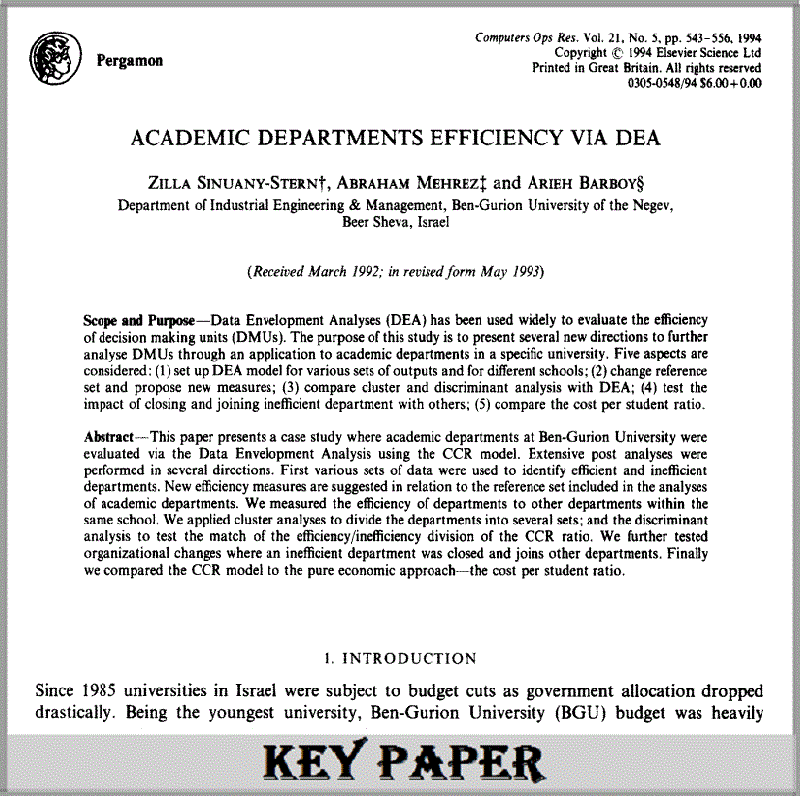
Academic departments efficiency via DEA
Authors: Sinuanystern Z, Mehrez A, Barboy A.
Journal: Computers & Operations Research
Published: 1994
Abstract: This paper presents a case study where academic departments at Ben-Gurion University were evaluated via the Data Envelopment Analysis using the CCR model. Extensive post analyses were performed in several directions. First various sets of data were used to identify efficient and inefficient departments. New efficiency measures am suggested in relation to the reference set included in the analyses of academic departments. We measured the efficiency of departments to other departments within the same school. We applied cluster analyses to divide the departments into several sets; and the discriminant analysis to test the match of the efficiency/inefficiency division of the CCR ratio. We further tested organizational changes where an inefficient department was closed and joins other departments. Finally we compared the CCR model to the pure economic approach-the cost per student ratio.
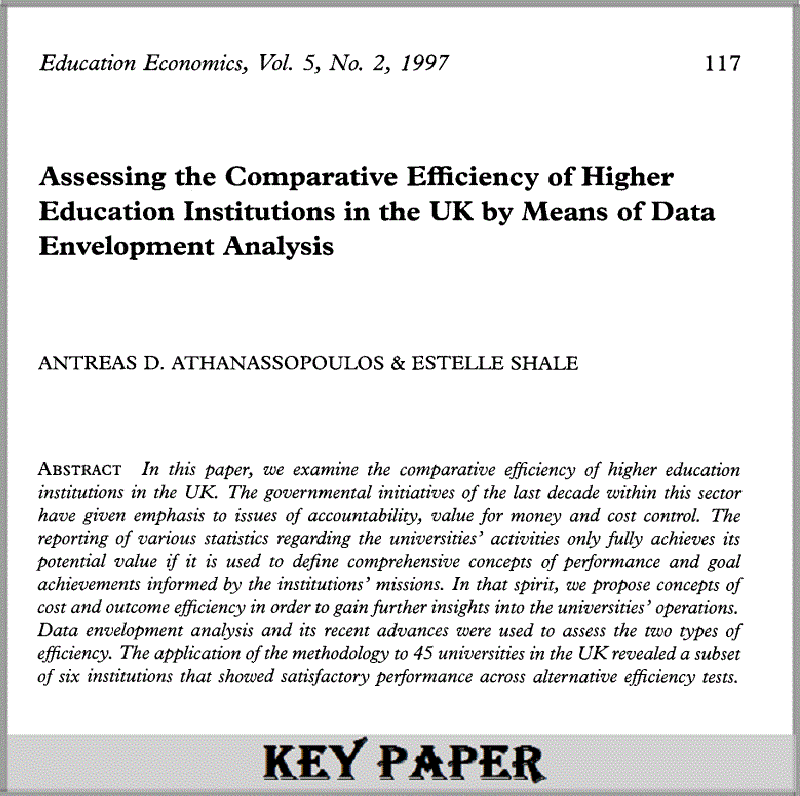
Assessing the comparative efficiency of higher education institutions in the UK by mean of data envelopment analysis
Authors: Athanassopoulos, A.D. and Shale, E.
Journal: Education Economics
Published: 1997
Abstract: In this paper, we examine the comparative efficiency of higher education institutions in the UK. The governmental initiatives of the last decade within this sector have given emphasis to issues of accountability, value for money and cost control. The reporting of various statistics regarding the universities' activities only fully achieves its potential value if it is used to define comprehensive concepts of performance and goal achievements informed by the institutions' missions. In that spirit, we propose concepts of cost and outcome efficiency in order to gain further insights into the universities' operations. Data envelopment analysis and its recent advances were used to assess the two types of efficiency. The application of the methodology to 45 universities in the UK revealed a subset of six institutions that showed satisfactory performance across alternative efficiency tests.
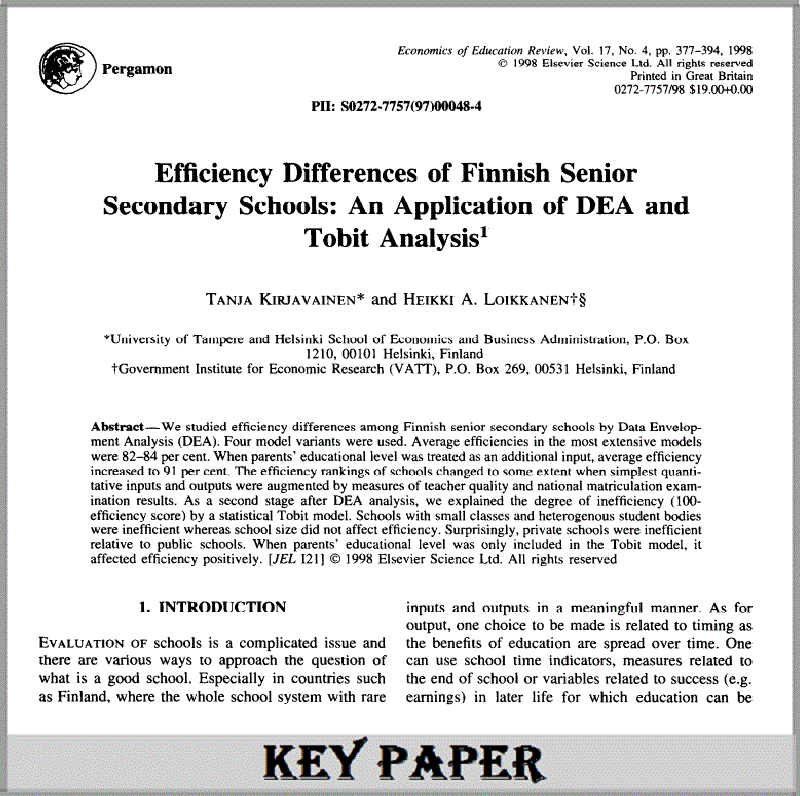
Efficiency differences of Finnish senior secondary schools: an application of DEA and Tobit analysis
Authors: Kirjavainen T., Loikkanen H.A.
Journal: Economics of Education Review
Published: 1998
Abstract: We studied efficiency differences among Finnish senior secondary schools by Data Envelopment Analysis (DEA). Four model variants were used. Average efficiencies in the most extensive models
were 82-84 per cent. When parents’ educational level was treated as an additional input, average efficiency increased to 91 per cent. The efficiency rankings of schools changed to some extent when simplest quantitative inputs and outputs were augmented by measures of teacher quality and national matriculation examination results. As a second stage after DEA analysis, we explained the degree of inefficiency (l00-efficiency score) by a statistical Tobit model. Schools with small classes and heterogenous student bodies were inefficient whereas school size did not affect efficiency. Surprisingly, private schools were inefficient relative to public schools. When parents’ educational level was only included in the Tobit model, it affected efficiency positively. [JEL 1211 0 1998 Elsevier Science Ltd. All rights reserved.
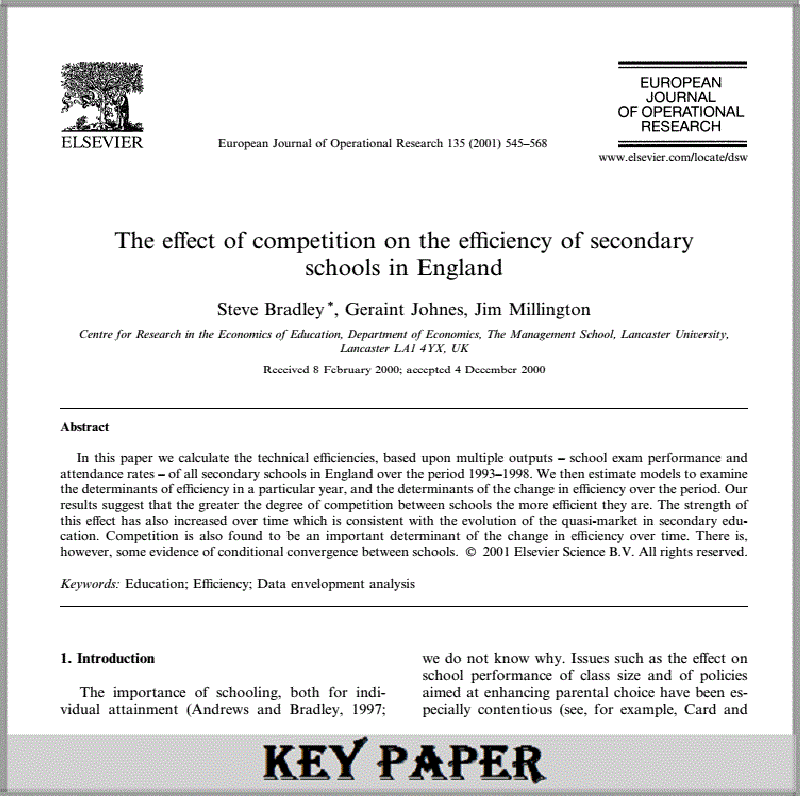
The effect of competition on the efficiency of secondary schools in England
Authors: Bradley S, Johnes G, Millington J.
Journal: European Journal of Operational Research
Published: 2001
Abstract: In this paper we calculate the technical efficiencies, based upon multiple outputs – school exam performance and attendance rates – of all secondary schools in England over the period 1993–1998. We then estimate models to examine the determinants of efficiency in a particular year, and the determinants of the change in efficiency over the period. Our results suggest that the greater the degree of competition between schools the more efficient they are. The strength of this effect has also increased over time which is consistent with the evolution of the quasi-market in secondary education. Competition is also found to be an important determinant of the change in efficiency over time. There is, however, some evidence of conditional convergence between schools.
The using of the DEA technique in the Education sector is increasing over time. This section introduces new articles that present a new method or significant results in this area.
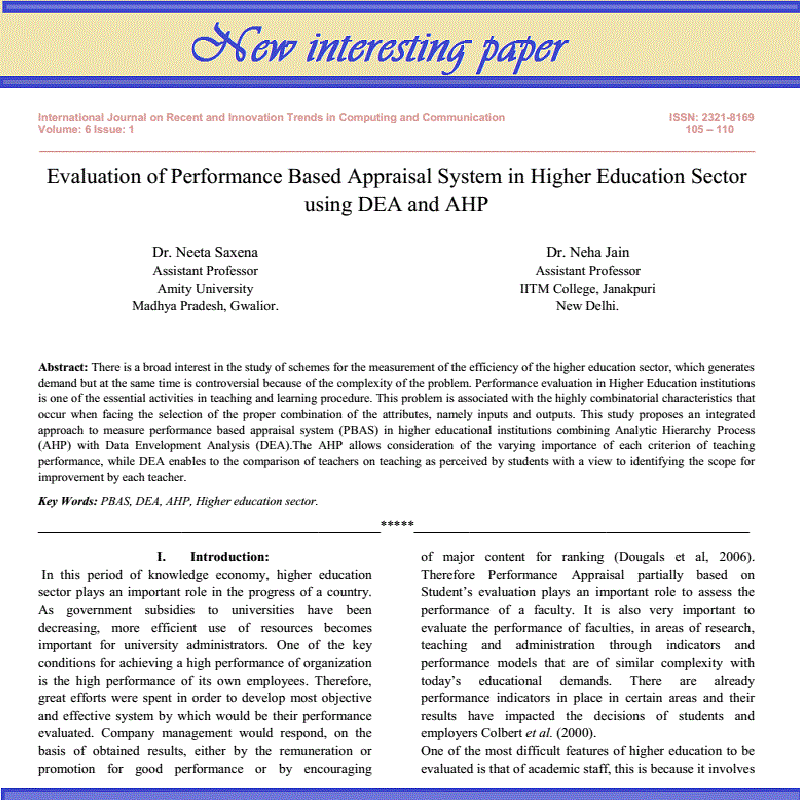
Evaluation of Performance Based Appraisal System in Higher Education Sector using DEA and AHP
Authors: Dr. Neeta Saxena, Dr. Neha Jain
Journal: International Journal on Recent and Innovation Trends in Computing and Communication
Published: 2018
Abstract: There is a broad interest in the study of schemes for the measurement of the efficiency of the higher education sector, which generates demand but at the same time is controversial because of the complexity of the problem. Performance evaluation in Higher Education institutions is one of the essential activities in teaching and learning procedure. This problem is associated with the highly combinatorial characteristics that occur when facing the selection of the proper combination of the attributes, namely inputs and outputs. This study proposes an integrated approach to measure performance based appraisal system (PBAS) in higher educational institutions combining Analytic Hierarchy Process (AHP) with Data Envelopment Analysis (DEA).The AHP allows consideration of the varying importance of each criterion of teaching performance, while DEA enables to the comparison of teachers on teaching as perceived by students with a view to identifying the scope for improvement by each teacher.
Published: 2018
Abstract: The higher education system in Indonesia can be considered not only as an important source of developing knowledge in the country but also could create favourable living conditions for the country. Therefore, it is not surprising that enrollments in higher education continue to expand. Data envelopment analysis (DEA) is a method to evaluate the technical efficiency of production units which have multiple input and output. The higher learning institution considered in this paper is Min Aceh province of Indonesia. This research framework of this research is DEA, with the bounded output. Accordingly, we present some important differences in efficiency performance of higher education institute. Finally, we will discuss the effort from these departments to become efficient.
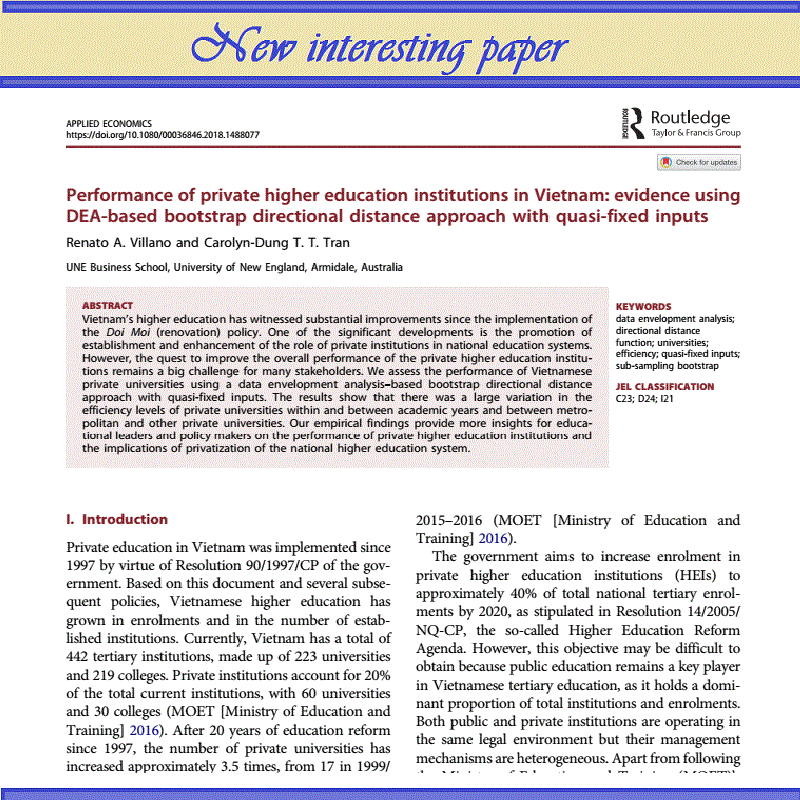
Performance of private higher education institutions in Vietnam: evidence using DEA-based bootstrap directional distance approach with quasi-fixed inputs
Authors: Renato A. Villano and Carolyn-Dung T. T. Tran
Journal: Applied Economics
Published: 2018
Abstract: Vietnam’s higher education has witnessed substantial improvements since the implementation of the Doi Moi (renovation) policy. One of the significant developments is the promotion of establishment and enhancement of the role of private institutions in national education systems. However, the quest to improve the overall performance of the private higher education institutions remains a big challenge for many stakeholders. We assess the performance of Vietnamese private universities using a data envelopment analysis–based bootstrap directional distance approach with quasi-fixed inputs. The results show that there was a large variation in the efficiency levels of private universities within and between academic years and between metropolitan and other private universities. Our empirical findings provide more insights for educational leaders and policy makers on the performance of private higher education institutions and the implications of privatization of the national higher education system.
STATISTICS
In this section, we list a series of selected descriptive statistics involving the numbers and distributions of papers, journals and keywords of DEA and Education related articles during the years 1987 to 2020.
1. Statistics involving publications by year
The following chart shows the distribution of DEA and education articles published by year. The greatest number of articles is in 2016.
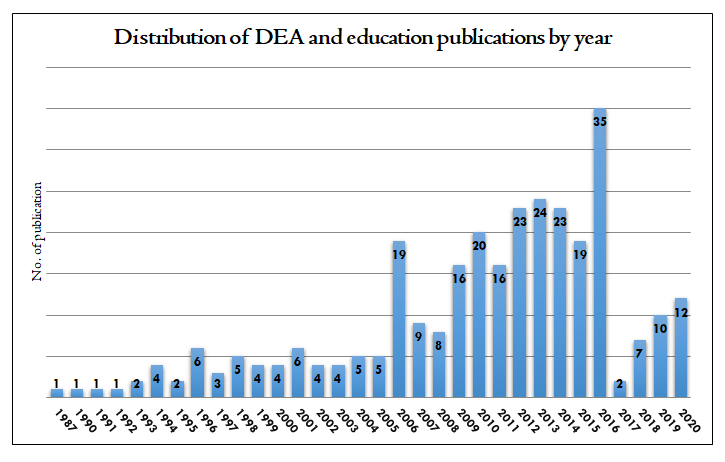
2. Statistics involving publications by journal
The following chart shows ten journals that have published the greatest number of DEA and education papers in the past years. Journals such as Economics of Education Review, Socio-Economic Planning Sciences, and European Journal of Operational Research are the most utilized.
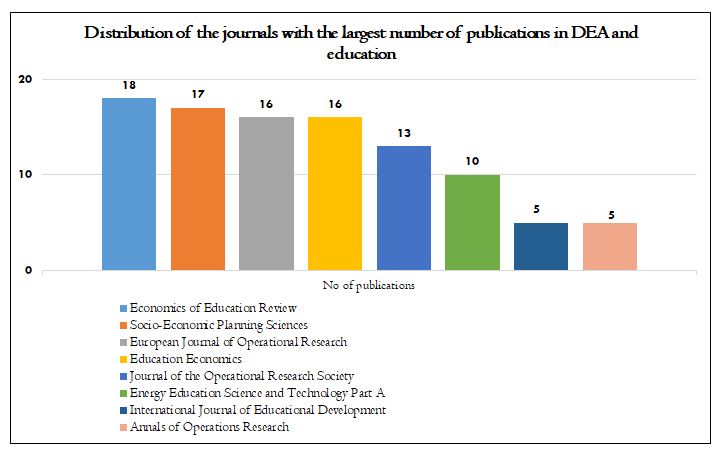
3. Statistics involving keywords used
The following table lists the most popular keywords by number of publications.
REFERENCES
296. Determinants of efficiency in state-chartered financial institutions: Why financial education and freedom matter
Emmanuel Sousa de Abreu, Herbert Kimura
Heliyon
29 December 2020
Keywords:
295. Research efficiency analysis of China’s university faculty members: A modified meta-frontier DEA approach
Zhanxin Ma, Kok Fong See, Chunying Zhao
Socio-Economic Planning Sciences
Available online 14 September 2020
Keywords:
294. Evaluation and determinants of preschool effectiveness in Chile
Víctor Giménez, Claudio Thieme, Emili Tortosa-Ausina
Socio-Economic Planning Sciences
Available online 25 August 2020
Keywords:
293. Performance evaluation and enrollment quota allocation for higher education institutions in China
Ganggang Zhang, Jie Wu, Qingyuan Zhu
Evaluation and Program Planning
26 May 2020
Keywords:
292. Efficiency analysis of research universities in Turkey
Rza Mammadov, Ahmet Aypay
International Journal of Educational Development
10 March 2020
Keywords:
291. Colombian higher education institutions evaluation
Lina P. Navas, Felipe Montes, Roberto Zarama
Socio-Economic Planning Sciences
21 January 2020
Keywords:
290. Performance of Education and Research in Latin American Countries through Data Envelopment Analysis (DEA)
Maritza Torres-Samuel, Carmen Luisa Vásquez, Jessica Manosalva
Procedia Computer Science
14 April 2020
Keywords:
289. Challenges of combining different methods and tools to improve the performance monitoring in buildings: A case study of elementary schools and kindergartens
Boris Sučić, Stane Merše, Željko Tomšić
Energy and Buildings
5 November 2020
Keywords:
288. School efficiency in low and middle income countries: An analysis based on PISA for development learning survey
Marcos Delprato, Germán Antequera
International Journal of Educational Development
4 November 2020
Keywords:
287. Efficiency of secondary schools in Portugal: A novel DEA hybrid approach
C. O. Henriques, O. D. Marcenaro-Gutierrez
Socio-Economic Planning Sciences
Available online 28 September 2020
Keywords:
286. Impact evaluation in a multi-input multi-output setting: Evidence on the effect of additional resources for schools
Giovanna D’Inverno, Mike Smet, Kristof De Witte
European Journal of Operational Research
2 September 2020
Keywords:
285. Performance assessment of upper secondary schools in Italian regions using a circular pseudo-Malmquist index
Ana S. Camanho, Luisa Varriale, Thiago Sobral
European Journal of Operational Research
30 July 2020
Keywords:
284. Measuring the efficiency changes of private universities of Korea: A two-stage network data envelopment analysis
Mehdi Shamohammadi, Dong-hyun Oh
Technological Forecasting and Social Change
11 September 2019
Keywords:
283. Assessing the performance of UK universities in the field of chemical engineering using data envelopment analysis
Andrés González-Garay, Carlos Pozo, Gonzalo Guillén-Gosálbez
Education for Chemical Engineers
5 July 2019
Keywords:
282. Evaluation of public HEI on teaching, research, and knowledge dissemination by Data Envelopment Analysis
Luis A. Moncayo–Martínez, Adrián Ramírez–Nafarrate, María Guadalupe Hernández–Balderrama
Socio-Economic Planning Sciences
24 June 2019
Keywords:
281. The impact of economic, social and cultural conditions on educational attainments
Raffaele Lagravinese, Paolo Liberati, Giuliano Resce
Journal of Policy Modeling
21 March 2019
Keywords:
280. Does Information from the Higher Education and R&D Institutes Improve the Innovation Efficiency of Logistic Firms?
Changhee Kim, Won Sug Shin
The Asian Journal of Shipping and Logistics
28 March 2019
Keywords:
279. Benchmarking of secondary schools based on Students’ results in higher education
Maria C. A. Silva, Ana S. Camanho, Flávia Barbosa
Omega
16 September 2019
Keywords:
278. A graphically based machine learning approach to predict secondary schools performance in Tunisia
Sonia Rebai, Fatma Ben Yahia, Hédi Essid
Socio-Economic Planning Sciences
4 July 2019
Keywords:
277. A data envelopment analysis of West Virginia school districts
Eduardo Minuci, Amir B. Ferreira Neto, Joshua Hall
Heliyon
8 July 2019
Keywords:
276. The efficiency of schools in developing countries, analysed through PISA 2012 data
Tommaso Agasisti, Pablo Zoido
Socio-Economic Planning Sciences
20 May 2019
Keywords:
275. Measuring efficiency in education: The influence of imprecision and variability in data on DEA estimates
Juan Aparicio, Jose M. Cordero, Lidia Ortiz
Socio-Economic Planning Sciences
15 March 2019
Keywords:
274. Energy use characteristics and benchmarking for higher education buildings
Maryam Khoshbakht, Zhonghua Gou, Karine Dupre
Energy and Buildings
13 January 2018
Keywords:
273. Do dropout and environmental factors matter? A directional distance function assessment of tunisian education efficiency
Ben Yahia, F., H. Essid, S. Rebai,
International Journal of Educational Development, 60: p. 120-127
2018
Keywords:
272. Does econometric methodology matter to rank universities? An analysis of Italian higher education system
Barra, C., R. Lagravinese, R. Zotti,
Socio-Economic Planning Sciences,. 62: p. 104-120
2018
Keywords:
271. The geographical efficiency of education and research: The ranking of U.S. universities
J.P. Guironnet, N. Peypoch,
Socio-Economic Planning Sciences, 62: p.44-55
2018
Keywords:
270. Energy use characteristics and benchmarking for higher education buildings
Khoshbakht, M., Z. Gou, K. Dupre,
Energy and Buildings, 164: p. 61-67
2018
Keywords:
269. Assessing the cost-effectiveness of university academic recruitment and promotion policies
Thanassoulis, E., D. Sotiros, G. Koronakos, D. Despotis,
European Journal of Operational Research,.264(2): p. 724-755
2018
Keywords:
268. A hybrid DEA-MOLP model for public school assessment and closure decision in the City of Philadelphia
Tavana, M., A. Ebrahimnejad, F. J. Santos-Arteaga, S.M. Mansourzadeh, R. Kazemi Matin,
Socio-Economic Planning Sciences, 61: p. 70-89
2018
Keywords:
267. Research productivity in management schools of India during 1968-2015: A directional benefit-of-doubt model analysis
Sahoo, B.K., R. Singh, B. Mishra, K. Sankaran,
Omega, 66(1): p. 118-139
2017
Keywords:
266. Comparing school ownership performance using a pseudo-panel database: A Malmquist-type index approach,
Aparicio, J., E. Crespo-Cebada, F. Pedraja-Chaparro, D. Santín,
European Journal of Operational Research, 256(2): p. 533-542
2017
Keywords:
265. Technical efficiency and productivity for higher education institutions in Sweden
Andersson, C., J. Antelius, J. Månsson and K. Sund,
Scandinavian Journal of Educational Research, p. 1-19
2016
Keywords:
264. The efficiency of public education spending in Latin America: A comparison to high income countries
Azar Dufrechou, P.,
International Journal of Educational Development, 49: p. 188-203
2016
Keywords:
263. A Directional Distance Approach Applied To Higher Education: An Analysis Of Teaching-Related Output Efficiency
Barra, C. and R. Zotti,
Annals of Public and Cooperative Economics, 87(2): p. 145-173
2016
Keywords:
262. Managerial Efficiency in Higher Education Using Individual Versus Aggregate Level Data. Does the choice of Decision Making Units Count?
Barra, C. and R. Zotti,
Managerial and Decision Economics,. 37(2): p. 106-126
2016
Keywords:
261. Measuring Efficiency in Higher Education: An Empirical Study Using a Bootstrapped Data Envelopment Analysis
Barra, C. and R. Zotti,
International Advances in Economic Research, 22(1): p. 11-33
2016
Keywords:
260. Apples to oranges: benchmarking vocational education and training programmes
Bogetoft, P. and J. Wittrup,
School Effectiveness and School Improvement, p. 1-26
2016
Keywords:
259. Australian university productivity growth and public funding revisited
Carrington, R., C. O’Donnell and D.S.P. Rao,
Studies in Higher Educationp. 1-22.
2016
Keywords:
258. The relative efficiencies of research universities of science and technology in China: Based on the data envelopment analysis and stochastic frontier analysis
Chuanyi, W., L. Xiaohong and Z. Shikui,
Eurasia Journal of Mathematics, Science and Technology Education, 12(10): p. 2753-2770
2016
Keywords:
257. Output-orientated Data Envelopment Analysis for measuring recycling efficiency: an application at Italian regional level
Crociata, A. and N. Mattoscio,
Environmental Education Research, 22(4): p. 551-570
2016
Keywords:
256. A Multi-Attribute Decision-Making Model for Construction Enterprise Resource Planning System Selection
El-Mashaleh, M.S., K.H. Hyari, A.N. Bdour and S.M. Rababeh,
International Journal of Construction Education and Research, 12(1): p. 66-79
2016
Keywords:
255. Evaluation of the performance of educational groups of Farhangian University, Province of Guilan, using data envelopment analysis and prioritization based on the AHP model
Esmaeili, Z. and S.A. Rezaeian,
Research Journal of Applied Sciences, 11(4): p. 116-120
2016
Keywords:
254. Measuring the relative efficiency of education organizations of country: Data envelopment analysis approach
Ghaffari, H. and A. Arab,
International Business Management, 10(15): p. 3099-3107
2016
Keywords:
253. Efficiency analysis in multi-period systems: an application to performance evaluation in Czech higher education
Jablonsky, J.,
Central European Journal of Operations Research, 24(2): p. 283-296
2016
Keywords:
252. Sustainable educational supply chain performance measurement through DEA and differential evolution: A case on Indian HEI
Jauhar, S.K., M. Pant and A.K. Nagar,
Journal of Computational Science
2016
Keywords:
251. The efficiency of higher education institutions in England revisited: comparing alternative measures
Johnes, G. and K. Tone,
Tertiary Education and Management, p. 1-15
2016
Keywords:
250. Performance evaluation of education system with human capital approach by data envelopment analysis and TOPSIS-with a case study
Karbasian, M., B. Khayambashi and M.M. Tavakoli,
International Journal of Management in Education, 10(4): p. 414-432
2016
Keywords:
249. Green revolution conversion of offline education to online education
Karthik, A. and G. Brindha,
International Journal of Pharmacy and Technology, 8(3): p. 15393-15407
2016
Keywords:
248. The efficiency of regional higher education systems and competition in Russia
Leshukov, O.V., D.P. Platonova and D.S. Semyonov,
Economy of Region, (2): p. 417-426
2016
Keywords:
247. Evaluation of the availability of education and health services
Linhares, L.C., G.I. Diniz and R.F.R. Da Costa,
Espacios, 37(13)
2016
Keywords:
246. Assessing the research efficiency of higher education institutions in Chile: A data envelopment analysis approach
Munoz, D.A.,
International Journal of Educational Management, 30(6): p. 809-825
2016
Keywords:
245. Assessing the efficiency of secondary schools in Chile: a data envelopment analysis
Munoz, D.A. and J.P. Queupil,
Quality Assurance in Education,. 24(3): p. 306-328
2016
Keywords:
244. The economic efficiency of european football clubs - Data Envelopment Analysis (DEA) approach
Pyatunin, A.V., A.B. Vishnyakova, N.L. Sherstneva, S.P. Mironova, S.A. Dneprov and Y.P. Grabozdin,
International Journal of Environmental and Science Education, 11(15): p. 7515-7534
2016
Keywords:
243. Assessment of efficiency in basic and secondary education in Tunisia: A regional analysis.
Ramzi, S., A. Afonso and M. Ayadi,
International Journal of Educational Development, 51: p. 62-76
2016
Keywords:
242. A comparative assessment of the performance of select higher education institutes in India
Sahney, S. and J. Thakkar,
Quality Assurance in Education, 24(2): p. 278-302
2016
Keywords:
241. An empirical analysis of the performance of Vietnamese higher education institutions
Tran, C.D.T.T. and R.A. Villano,
Journal of Further and Higher Education,: p. 1-15
2016
Keywords:
240. Evaluating the performance of higher education institutions in Europe: a nonparametric efficiency analysis of 944 institutions
Veiderpass, A. and M. McKelvey,
Applied Economics, 48(16): p. 1504-1514
2016
Keywords:
239. Assessment of TFP in European and American higher education institutions – application of Malmquist indices
Wolszczak-Derlacz, J.,
Technological and Economic Development of Economy, p. 1-22
2016
Keywords:
238. Using DEA and CA approachs for educational production efficiency: Evidence from ShangHai PISA measurement
Yuan, Y., Q. Ying and M. Shan,
International Journal of Simulation: Systems, Science and Technology, 17(44): p. 10.1-10.5
2016
Keywords:
237. Effectiveness and efficiency of research in Germany over time: an analysis of German business schools between 2001 and 2009
Clermont, M.,
Scientometrics, 108(3): p. 1347-1381
2016
Keywords:
236. Centralized allocation of human resources. An application to public schools
López-Torres, L. and D. Prior,
Computers and Operations Research, 73: p. 104-114
2016
Keywords:
235. Benchmarking public school performance by unionized status.
Overton, K., S.J. Joo and P.A. Stoeberl,
Benchmarking, 23(7): p. 1626-1642
2016
Keywords:
234. Best practices and their impact on the performance of Brazilian elementary school students
Regalo, E.H., A.P. Salgado, Jr., J.C. Novi and E. Falsarella, Jr.,
Meta: Avaliacao, 8(22): p. 1-28
2016
Keywords:
233. School practices and student performance: Use of quantitative and qualitative approaches
Salgado Junior, A.P., J.C. Novi and J. Ferreira
Educacao e Sociedade, 37(134): p. 217-243
2016
Keywords:
232. Application of PCA and DEA to recognize the true expertise of a firm: a case with primary schools
Sarkar, S.,
Benchmarking, 23(3): p. 740-751
2016
Keywords:
231. Cost and learning efficiency drivers in Australian schools: a two-stage network DEA approach
Wanke, P., V. Blackburn and C.P. Barros,
Applied Economics, 48(38): p. 3577-3604
2016
Keywords:
230. A directional distance approach applied to higher education: An analysis of teaching-related output efficiency
Barra, C. and R. Zotti,
Annals of Public and Cooperative Economics
2015
Keywords:
229. The efficiency of educational production: A comparison of the Nordic countries with other OECD countries
Bogetoft, P., E. Heinesen and T. Tranæs,
Economic Modelling, 50: p. 310-321
2015
Keywords:
228. Factors determining the efficiency of higher education in the european union and Turkey
Bursalıoğlu, S.A. and S. Selim,
Bilig, 74: p. 45-70
2015
Keywords:
227. Efficiency of public educational institutions of the district of santa marta (Colombia) through “data envelopment analysis”
Caballero, R.E., D.V.L. Cadavid and J.M. Agudelo Toloza,
Ingeniare,. 23(4): p. 579-593
2015
Keywords:
226. The expansion of enrollment in higher education is possible? Static analysis and dynamic efficiency in the management of Brazilian public universities
Duenhas, R.A., M.T.A. França and C.F.C. Rolim,
Espacios, 36(23)
2015
Keywords:
225. Academic performance and burnout: an efficient frontier analysis of resource use efficiency among employed university students.
Galbraith, C.S. and G.B. Merrill,
Journal of Further and Higher Education, 39(2): p. 255-277
2015
Keywords:
224. Determinants of school efficiency: The case of primary schools in the state of Geneva, Switzerland
Huguenin, J.M.,
International Journal of Educational Management, 29(5): p. 539-562
2015
Keywords:
223. Operational research in education
Johnes, J.,
European Journal of Operational Research, 243(3): p. 683-696
2015
Keywords:
222. Measuring the efficiency and productivity change of Greek universities over the time period 2005-2009
Kyratzi, P., C. Tsamadias and D. Giokas,
International Journal of Education Economics and Development, 6(2): p. 111-129
2015
Keywords:
221. Research on the ranking of university education based on Grey-TOPSIS-DEA method
Liu, J. and S. Li,
International Journal of Emerging Technologies in Learning, 10(8): p. 51-54
2015
Keywords:
220. Research on the quality evaluation system of entrepreneurship education based on efficiency
Liu, X.,
Open Cybernetics and Systemics Journal,. 9: p. 2969-2974
2015
Keywords:
219. Benchmarking and target setting with expert preferences: An application to the evaluation of educational performance of Spanish universities
Ruiz, J.L., J.V. Segura and I. Sirvent,
European Journal of Operational Research, 242(2): p. 594-605
2015
Keywords:
218. Technical efficiency in private higher education institutions in Malaysia
Shahar, S., R. Ismail, Z.M. Noor and I. Yussof,
Jurnal Ekonomi Malaysia,. 49(1): p. 103-119
2015
Keywords:
217. Evaluating the performance of higher education institutions in Europe: a nonparametric efficiency analysis of 944 institutions
Veiderpass, A. and M. McKelvey,
Applied Economics
2015
Keywords:
216. Assessing level of productivity with data envelopment analysis technology in senior high school (SMA) Dumai, Riau, Indonesia
Rozamuri, A.M., N.R.M. Suradi and W. Suparta,
Advanced Science Letters, 21(2): p. 207-209
2015
Keywords:
215. Administrative and pedagogical practices that can contribute to the performance of students in municipal elementary schools in Prova Brasil
Salgado A.P, Jr. and J.C. Novi,
Ensaio, 23(88): p. 631-662
2015
Keywords:
214. School management efficiency: In search of the best practices in Brazilian municipal elementary schools
Salgado, A.P., Jr., J.C. Novi, J. Ferreira, M.M.B. De Oliveira and P.S. Miranda,
Meta: Avaliacao, 7(19): p. 85-122
2015
Keywords:
213. Measuring the efficiency of public schools in Uruguay: Main drivers and policy implications
Santín, D. and G. Sicilia,
Latin American Economic Review, 24(1)
2015
Keywords:
212. The Efficiency of Public Spending on Education: An empirical comparison of EU countries
Agasisti, T.,
European Journal of Education, 49(4): p. 543-557
2014
Keywords:
211. Development of the information society and its impact on the education sector in the EU: Efficiency at the regional (NUTS 2) level
Aristovnik, A.,
Turkish Online Journal of Educational Technology. 13(2): p. 54-60
2014
Keywords:
210. Measuring relative efficiency of secondary education in selected EU and OECD countries: the case of Slovenia and Croatia
Aristovnik, A. and A. Obadić,
Technological and Economic Development of Economy, 20(3): p. 419-433
2014
Keywords:
209. Nonparametric estimation of education productivity incorporating nondiscretionary inputs with an application to Dutch schools
Brennan, S., C. Haelermans and J. Ruggiero,
European Journal of Operational Research, 234(3): p. 809-818
2014
Keywords:
208. Research on evaluation model of fuzzy analytic hierarchy process and data envelopment analysis based on modern physical education teaching
Chen, J., S. Yuan and A. Yang,
Journal of Chemical and Pharmaceutical Research, 6(7): p. 1135-1140
2014
Keywords:
207. Determinants of public spending efficiency in education and health: evidence from selected CEMAC countries
Fonchamnyo, D.C. and M.C. Sama,
Journal of Economics and Finance,
2014
Keywords:
206. Efficiency and mergers in english higher education 1996/97 to 2008/9: Parametric and non-parametric estimation of the multi-input multi-output distance function
Johnes, J.,
Manchester School, 82(4): p. 465-487
2014
Keywords:
205. Nonparametric measurement of productivity and efficiency in education
Johnson, A.L. and J. Ruggiero,
Annals of Operations Research, 221(1): p. 197-210
2014
Keywords:
204. Evaluating the effectiveness of research centers and institutes in universities: Disciplines and life cycle stages
Lee, D., S. Kim and S.H. Cha,
KEDI Journal of Educational Policy, 11(1): p. 119-137
2014
Keywords:
203. Productivity changes of the renewable energy installed capacity: An empirical study relating to 31 European countries between 2002 and 2011
lo Storto, C. and B. Capano,
Energy Education Science and Technology Part A: Energy Science and Research, 32(5): p. 3061-3072
2014
Keywords:
202. Application of dea method in efficiency evaluation of public higher education institutions
Nazarko, J. and J. Šaparauskas,
Technological and Economic Development of Economy, 20(1): p. 25-44
2014
Keywords:
201. The efficiency of education expenditure in latin america and lessons for colombia
Salazar Cuéllar, A.F.,
Desarrollo y Sociedad, (74): p. 19-67
2014
Keywords:
200. Research and application of investment efficiency evaluation model on coal mine construction project
Shan, R., X. Zhao, X. Chen and J. Li,
Energy Education Science and Technology Part A: Energy Science and Research, 32(6): p. 7855-7864
2014
Keywords:
199. Measuring distance learning performance with data envelopment analysis
Xiaoming, Y., C.J. Shieh and W.C. Wu,
Eurasia Journal of Mathematics, Science and Technology Education, 10(6): p. 559-564
2014
Keywords:
198. Research on education management evaluation standard system
Zhao, J.,
Energy Education Science and Technology Part A: Energy Science and Research, 32(5): p. 4485-4490
2014
Keywords:
197. Evaluation of eco-efficiency about Tangshan iron and steel industry based on DEA
Zhou, L. and X. Wan,
Energy Education Science and Technology Part A: Energy Science and Research, 32(6): p. 6421-6428
2014
Keywords:
196. Measuring efficiency in australian Schools: A preliminary analysis
Blackburn, V., S. Brennan and J. Ruggiero,
Socio-Economic Planning Sciences,. 48(1): p. 4-9
2014
Keywords:
195. Preliminary planning efficiency evaluation for school buildings considering the tradeoffs of MOOP and planning preferences
Cheng, M.Y. and C.S. Chen,
Journal of Civil Engineering and Management, 20(2): p. 211-222
2014
Keywords:
194. Productivity, efficiency, and technical change of Tunisian schools: A bootstrapped Malmquist approach with quasi-fixed inputs
Essid, H., P. Ouellette and S. Vigeant,
Omega (United Kingdom),. 42(1): p. 88-97
2014
Keywords:
193. Performance assessment and ranking of Shiraz high schools using DEA
Gerami, J., F. Sivandzadeh, H. Manzari and M.R. Mozaffari,
Advances in Environmental Biology, 8(12): p. 138-146
2014
Keywords:
192. Competition and public high school performance
Harrison, J. and P. Rouse,
Socio-Economic Planning Sciences, 48(1): p. 10-19
2014
Keywords:
191. Decision-making factors of school building renovations for improving built environment
Liao, Y.T., C.M. Chiang, K.S. Liu and C.T. Tzeng,
Journal of Environmental Protection and Ecology, 15(3): p. 1246-1254
2014
Keywords:
190. Combining the assumptions of variable and constant returns to scale in the efficiency evaluation of secondary schools
Podinovski, V.V., I. Ismail, T. Bouzdine-Chameeva and W. Zhang,
European Journal of Operational Research, 239(2): p. 504-513
2014
Keywords:
189. The efficiency of Italian secondary schools and the potential role of competition: A data envelopment analysis using OECD-PISA2006 data
Agasisti, T.,
Education Economics, 21(5): p. 520-544
2013
Keywords:
188. ICT expenditures and education outputs/outcomes in selected developed countries: An assessment of relative efficiency
Aristovnik, A.,
Campus-Wide Information Systems, 30(3): p. 222-230
2013
Keywords:
187. Data envelopment analysis and the efficiency of Romanian public higher education
Blidisel, R.G.,
Metalurgia International, 18(3): p. 221-223
2013
Keywords:
186. The efficiency of public schools: the case of Kuwait
Burney, N.A., J. Johnes, M. Al-Enezi and M. Al-Musallam,
Education Economics, 21(4): p. 360-379
2013
Keywords:
185. An assessment of schools' efficiency of different educational systems
Casalprim, M., J. Rialp, D. Prior and B. Sabrià,
Mediterranean Journal of Social Sciences, 4(11): p. 631-639
2013
Keywords:
184. A study on using performance of electronic databases with combination of relative efficiency and criteria weighting perspectives
Chang, C.C., P.L. Liu and C.H. Tsai,
Journal of Educational Media and Library Science, 50(4)
2013
Keywords:
183. Enhancing e-learning management systems to promoting the management efficiency of tourism and hospitality education
Chang, T.Y.,
Anthropologist, 16(3): p. 473-485
2013
Keywords:
182. Efficiency at faculties of economics in the czech public higher education institutions: Two different approaches
Flégl, M. and K. Vltavská,
International Education Studies,. 6(10): p. 1-12
2013
Keywords:
181. Efficiency in english higher education institutions revisited: A network approach
Johnes, G.,
Economics Bulletin,. 33(4): p. 2698-2706
2013
180. Data envelopment analysis of higher education competitiveness indices in Europe
Kabók, J., T. Kis, M. Csüllög and I. Lendák,
Acta Polytechnica Hungarica, 10(3): p. 185-201
2013
Keywords:
179. Classification using DEA and SVM approaches: The Empirical study of higher education
Kao, H.Y., C.H. Huang and J.Y. Chen,
Information (Japan), 16(11): p. 7801-7810
2013
Keywords:
178. Data Envelopment Analysis modeling for measuring knowledge management performance in Malaysian higher educational institutions
Kuah, C.T. and K.Y. Wong,
Information Development, 29(3): p. 200-216
2013
Keywords:
177. A Weifang city's research on energy economics forecasting and efficiency evaluation.
Meng, X. and J. Ma,
Energy Education Science and Technology Part A: Energy Science and Research,. 31(1): p. 101-106
2013
Keywords:
176. Households' living situation and the efficient provision of primary education in Burkina Faso
Miningou, T.W. and V. Vierstraete,
Economic Modelling, 35: p. 910-917
2013
Keywords:
175. Evaluation of division's efficiency of physical education organisation in Isfahan province by data envelopment analysis
Pourakbar, Z., B. Arbabshirani, S.R. Hejazi, G.A. Raissi-Ardali and H. Shirouyehzad,
International Journal of Productivity and Quality Management, 11(3): p. 269-286
2013
Keywords:
174. Assessment of the performance of physical education organisation of Isfahan Province using data envelopment analysis.
Pourakbar, Z., B. Arbabshirani, S.R. Hejazi and H. Shirouyehzad,
International Journal of Services and Operations Management, 15(2): p. 215-237
2013
Keywords:
173. Efficiency and heterogeneity of public spending in education among Italian regions
Sibiano, P. and T. Agasisti,
Journal of Public Affairs, 13(1): p. 12-22
2013
Keywords:
172. The inner Mongolia electric power enterprise performance prediction based on the method of dea
Wei, Z. and J. Ma,
Energy Education Science and Technology Part A: Energy Science and Research, 31(1): p. 377-380
2013
Keywords:
171. Efficiency and Equity in Funding for Government Schools in Australia
Chakraborty, K. and V.C. Blackburn,
Australian Economic Papers, 52(3-4): p. 127-142
2013
Keywords:
170. Small is not that beautiful after all: Measuring the scale efficiency of Tunisian high schools using a DEA-bootstrap method
Essid, H., P. Ouellette and S. Vigeant,
Applied Economics, 45(9): p. 1109-1120
2013
Keywords:
169. Centralized or decentralized control of school resources? A network model
Grosskopf, S., K. Hayes, L.L. Taylor and W. Weber,
Journal of Productivity Analysis, p. 1-12
2013
Keywords:
168. Estimating technical and allocative efficiency in the public sector: A nonparametric analysis of Dutch schools
Haelermans, C. and J. Ruggiero,
European Journal of Operational Research, 227(1): p. 174-181
2013
Keywords:
167. Do parents perceive the technical quality of public schools? An activity analysis approach
López-Torres, L. and D. Prior,
Regional and Sectoral Economic Studies, 13(3): p. 39-60
2013
Keywords:
166. Assessing the evolution of school performance and value-added: Trends over four years
Portela, M.C., A.S. Camanho and A. Keshvari,
Journal of Productivity Analysis, 39(1): p. 1-14
2013
Keywords:
165. Comparing German and Italian public universities: Convergence or divergence in the higher education landscape?
Agasisti, T. and C. Pohl,
Managerial and Decision Economics, 33(2): p. 71-85
2012
Keywords:
164. The impact of ict on educational performance and its efficiency in selected EU and OECD countries: A non-parametric analysis
Aristovnik, A.,
Turkish Online Journal of Educational Technology,. 11(3): p. 144-152
2012
Keywords:
163. Measuring relative efficiency in health and education sector: The case of east European countries
Aristovnik, A.,
Actual Problems of Economics, 138(12): p. 266-275
2012
Keywords:
162. The relative efficiency of education and R&D expenditures in the new EU member states
Aristovnik, A.,
Journal of Business Economics and Management, 13(5): p. 832-848
2012
Keywords:
161. Expanded function allied dental personnel and dental practice productivity and efficiency
Beazoglou, T.J., L. Chen, V.F. Lazar, L.J. Brown, S.C. Ray, D.R. Heffley, R. Berg and H.L. Bailit,
Journal of Dental Education, 76(8): p. 1054-1060
2012
Keywords:
160. Performance evaluation of Turkish electricity distribution market using a combined FAHP / TOPSIS method
Celen, A.,
Energy Education Science and Technology Part A: Energy Science and Research, 29(2): p. 1263-1276
2012
Keywords:
159. Two-stage performance model for evaluating the managerial efficiency of higher education: Application by the Taiwanese tourism and leisure department
Chang, T.Y., P.H. Chung and S.S. Hsu,
Journal of Hospitality, Leisure, Sport and Tourism Education, 11(2): p. 168-177
2012
Keywords:
158. Aplication of DEA method in comparative analysis of non-profit organizations efficiency (Case studies of state high mechanical technical schools of Belgrade district in periods of 1994/98. and 2004/2008. years)
Cvijanovic, J.M., Z. Sajfert, Z. Grujcic, J. Lazic and C. Besic,
Technics Technologies Education Management, 7(2): p. 724-746
2012
Keywords:
157. Identifying the Best Buys in U.S. Higher Education
Eff, E.A., C.C. Klein and R. Kyle,
Research in Higher Education, 53(8): p. 860-887
2012
Keywords:
156. Using data envelopment analysis to evaluate library electronic databases
Hwang, M.J., J.C. Shieh and C.C. Hsieh,
Journal of Educational Media and Library Science, 49(3): p. 343-368
2012
Keywords:
155. Assessment of greenhouse production performance of Turkey compared to use of her main energy sources
Kazancioglu, F.S.,
Energy Education Science and Technology Part A: Energy Science and Research, 29(2): p. 851-858
2012
Keywords:
154. Application of data envelopment analysis on the indicators contributing to learning and teaching performance
Montoneri, B., T.T. Lin, C.C. Lee and S.L. Huang,
Teaching and Teacher Education, 28(3): p. 382-395
2012
Keywords:
153. Efficiency analysis of provincial departments of physical education in IRAN
Soleimani-Damaneh, J., M. Soleimani-Damaneh and M. Hamidi,
International Journal of Information Technology and Decision Making, 11(5): p. 983-1008
2012
Keywords:
152. Total factor efficiency of Turkish state railways.
Sozen, A., I. Alp and B. Kurt,
Energy Education Science and Technology Part A: Energy Science and Research, 29(1): p. 663-678.
2012
Keywords:
151. An evaluation of educational provision quality at graduate level of rajabhat universities: Multi-level analysis
Tangchitcharoenkhul, R. and N. Wiratchai,
Asian Social Science,. 8(6): p. 104-114
2012
Keywords:
150. A study on circular economy efficiency benchmarking of power plants.
Zeng, S. and Y. Ren,
Energy Education Science and Technology Part A: Energy Science and Research, 30(SPEC .ISS.1): p. 1055-1062.
2012
Keywords:
149. A decision support methodology for increasing school efficiency in Bolivia's low-income communities
de Figueiredo, J.N. and M.A. Marca Barrientos,
International Transactions in Operational Research, 19(1-2): p. 99-121
2012
Keywords:
148. Efficiency of the top 50 business schools in the United States
Hirao, Y.,
Applied Economics Letters, 19(1): p. 73-78
2012
Keywords:
147. Investigating shared vision and size effects on public school performance: A proposed efficiency model
Kantabutra, S.,
International Journal of Innovation and Learning, 11(3): p. 217-232
2012
Keywords:
146. The efficiency of public and publicly subsidized high schools in Spain: Evidence from PISA-2006
Mancebón, M.J., J. Calero, Á. Choi and D.P. Ximénez-De-Embún,
Journal of the Operational Research Society, 63(11): p. 1516-1533
2012
Keywords:
145. Performance assessment of secondary schools: The snapshot of a country taken by DEA
Portela, M.C.S., A.S. Camanho and D. Borges,
Journal of the Operational Research Society, 63(8): p. 1098-1115
2012
Keywords:
144. Optimal planning model for school buildings at the planning and design stage: a Taichung City case study
Chen, C.S. and M.Y. Cheng,
Journal of the Chinese Institute of Civil and Hydraulic Engineering, 24(2): p. 197-209.
2012
Keywords:
143. Performances and spending efficiency in higher education: A European comparison through non-parametric approaches
Agasisti, T.,
Education Economics, 19(2): p. 199-224
2011
Keywords:
142. Evaluating the Efficiency of Research in Academic Departments: An Empirical Analysis in an Italian Region
Agasisti, T., A. Dal Bianco, P. Landoni, A. Sala and M. Salerno,
Higher Education Quarterly, 65(3): p. 267-289
2011
Keywords:
141. Productivity growth and biased technical change in French higher education
Barros, C.P., J.P. Guironnet and N. Peypoch,
Economic Modelling, 28(1-2): p. 641-646
2011
Keywords:
140. Efficiency assessment of banks in Serbia
Bulajic, M., G. Savic, S. Savic, N. Mihailovic and M. Martic,
Technics Technologies Education Management, 6(3): p. 657-662
2011
Keywords:
139. Inno-Qual efficiency of higher education: Empirical testing using data envelopment analysis
Chen, J.K. and I.S. Chen,
Expert Systems with Applications, 38(3): p. 1823-1834
2011
Keywords:
138. Accounting for exogenous influences in performance evaluations of teachers
De Witte, K. and N. Rogge,
Economics of Education Review, 30(4): p. 641-653
2011
Keywords:
137. An analysis on the efficiency of banks in Bosnia and Herzegovina using DEA method
Efendic, V. and A. Avdic,
Technics Technologies Education Management, 6(1): p. 147-158
2011
Keywords:
136. The impact of the performance of basic education institutions in the quality of higher education
Gramani, M.C.N. and A.L.C.M. Duarte,
Ensaio, 19(72): p. 679-702
2011
Keywords:
135. Demographic variations in basic science education in India: A case study of CSIR-UGC national eligibility test
Inderpal, A.K. Saini and R. Luthra,
Current Science, 101(5): p. 631-636
2011
Keywords:
134. Relative efficiency of higher education in Croatia and Slovenia: An international comparison
Obadic, A. and A. Aristovnik,
Amfiteatru Economic, 13(30): p. 362-376
2011
Keywords:
133. Granting teachers the "benefit of the doubt" in performance evaluations
Rogge, N.,
International Journal of Educational Management, 25(6): p. 590-614
2011
Keywords:
132. Costs and efficiency of higher education institutions in England: A DEA analysis
Thanassoulis, E., M. Kortelainen, G. Johnes and J. Johnes,
Journal of the Operational Research Society62(7): p. 1282-1297
2011
Keywords:
131. Efficiency of European public higher education institutions: A two-stage multi-country approach
Wolszczak-Derlacz, J. and A. Parteka,
Scientometrics, 89(3): p. 887-917
2011
Keywords:
130. BESP - benchmarking of Portuguese secondary schools
Portela, M.C.A.S., A.S. Camanho and D.N. Borges,
Benchmarking, 18(2): p. 240-260
2011
Keywords:
129. Performance modeling of Indian business schools: A DEA-neural network approach
Sreekumar, S. and S.S. Mahapatra,
Benchmarking,. 18(2): p. 221-239
2011
Keywords:
128. Measurement and determinants of efficiency and productivity in the further education sector in England
Bradley, S., J. Johnes and A. Little,
Bulletin of Economic Research,. 62(1): p. 1-30
2010
Keywords:
127. Efficiency and equity in private and public education: A nonparametric comparison
Cherchye, L., K. De Witte, E. Ooghe and I. Nicaise,
European Journal of Operational Research,. 202(2): p. 563-573
2010
Keywords:
126. Factors affecting educational attainment: evidence from Spanish Pisa 2006 results
Cordero Ferrera, J.M., E. Crespo Cebada and D. Santín González,
Regional and Sectoral Economic Studies,. 10(3): p. 1-22
2010
Keywords:
125. HBCU efficiency and endowments: An exploratory analysis
Coupet, J. and D. Barnum,
International Journal of Educational Advancement, 10(3): p. 186-197.
2010
Keywords:
124. The efficiency of nonprofit organizations (The case study of Belgrade's secondary schools of mechanical engineering)
Cvijanovic, J.M., C. Besic, Z. Sajfert, Z. Grujcic and J. Lazic,
Technics Technologies Education Management, 5(3): p. 575-589
2010
Keywords:
123. Assessing the efficiency of Turkish secondary education: Heterogeneity, centralization, and scale diseconomies
Davutyan, N., M. Demir and S. Polat,
Socio-Economic Planning Sciences,. 44(1): p. 35-44
2010
Keywords:
122. A DEA methodology to evaluate the impact of information asymmetry on the efficiency of not-for-profit organizations with an application to higher education in Brazil
de França, J.M.F., J.N. de Figueiredo and J.S. dos Lapa,
Annals of Operations Research, 173(1): p. 39-56
2010
Keywords:
121. Evaluating the efficiency of top liberal arts colleges
Eckles, J.E.,
Research in Higher Education, 51(3): p. 266-293
2010
Keywords:
120. What can we learn from education production studies
Eff, E.A. and C.C. Klein,
Eastern Economic Journal, 36(4): p. 450-479
2010
Keywords:
119. Measuring efficiency of Tunisian schools in the presence of quasi-fixed inputs: A bootstrap data envelopment analysis approach
Essid, H., P. Ouellette and S. Vigeant,
Economics of Education Review, 29(4): p. 589-596
2010
Keywords:
118. Educational efficiency in a dea-bootstrap approach
Giambona, F., E. Vassallo and E. Vassiliadis,
Economics Bulletin, 30(4): p. 2709-2719
2010
Keywords:
117. Efficiency Analysis of Public Universities In Thailand
Kantabutra, S. and J.C.S. Tang,
Tertiary Education and Management, 16(1): p. 15-33
2010
Keywords:
116. A comparative assessment of Greek universities' efficiency using quantitative analysis
Katharaki, M. and G. Katharakis,
International Journal of Educational Research, 49(4-5): p. 115-128
2010
Keywords:
115. Non-parametric approach for evaluating the performance of engineering schools
Kongar, E., J.M. Pallis and T.M. Sobh,
International Journal of Engineering Education, 26(5): p. 1210-1219
2010
Keywords:
114. Performance assessment of education institutions through interval DEA
Mahallati Rayeni, M. and F.H. Saljooghi,
Journal of Applied Sciences, 10(22): p. 2945-2949
2010
Keywords:
113. Teacher hiring practices and educational efficiency.
Naper, L.R.,
Economics of Education Review, 29(4): p. 658-668
2010
Keywords:
112. The performance of Portuguese secondary schools: An exploratory study
Sarrico, C.S., M.J. Rosa and I.P. Coelho,
Quality Assurance in Education, 18(4): p. 286-303
2010
Keywords:
111. A two-stage double-bootstrap data envelopment analysis of efficiency differences of New Zealand secondary schools
Alexander, W.R.J., A.A. Haug and M. Jaforullah,
Journal of Productivity Analysis,. 34(2): p. 99-110
2010
Keywords:
110. Malmquist indexes with quasi-fixed inputs: An application to school districts in Québec
Ouellette, P. and V. Vierstraete,
Annals of Operations Research, 173(1): p. 57-76
2010
Keywords:
109. Analysis of complementary methodologies for the estimation of school value added
Portela, M.C.A.S. and A.S. Camanho,
Journal of the Operational Research Society, 61(7): p. 1122-1132
2010
Keywords:
108. Measuring efficiency of higher education institutions
Agasisti, T. and A.D. Bianco,
International Journal of Management and Decision Making, 10(5-6): p. 443-465
2009
Keywords:
107. Reforming the university sector: Effects on teaching efficiency-evidence from Italy
Agasisti, T. and A. Dal Bianco,
Higher Education, 57(4): p. 477-498
2009
Keywords:
106. Beyond frontiers: Comparing the efficiency of higher education decision-making units across more than one country
Agasisti, T. and G. Johnes,
Education Economics, 17(1): p. 59-79
2009
Keywords:
105. Comparing efficiency in a cross-country perspective: The case of Italian and Spanish state universities
Agasisti, T. and C. Pérez-Esparrells,
Higher Education, 59(1): p. 85-103
2009
Keywords:
104. Efficiency in accounting education: evidence from Turkish Universities
Celik, O. and A. Ecer,
Critical Perspectives on Accounting, 20(5): p. 614-634
2009
Keywords:
103. An evaluation of the dynamics of the plan to develop first-class universities and top-level research centers in Taiwan
Chang, D.F., C.T. Wu, G.S. Ching and C.W. Tang,
Asia Pacific Education Review, 10(1): p. 47-57
2009
Keywords:
102. Technical efficiencies of faculties of economics in Turkey
Çokgezen, M.,
Education Economics, 17(1): p. 81-94
2009
Keywords:
101. The performance of micro firms in Kosova: Size, age and educational implications
Hoxha, D.,
International Journal of Globalisation and Small Business3(1): p. 25-40
2009
Keywords:
100. The relationship between programme management efficiency and evaluation results in an institute of technology: A Taiwanese case
Hsiao, H.C., C.H. Shen, C.M. Chou, S.C. Chen and L.Y. Chang,
World Transactions on Engineering and Technology Education, 7(2): p. 169-175
2009
Keywords:
99. Efficiency of primary schools in Beijing, China: An evaluation by data envelopment analysis.
Hu, Y., Z. Zhang and W. Liang,
International Journal of Educational Management, 23(1): p. 34-50
2009
Keywords:
98. Two-step data envelopment analysis approach for efficient engineering enrollment management
Kongar, E., T.M. Sobh and M. Baral,
International Journal of Engineering Education, 25(2): p. 391-402
2009
Keywords:
97. The efficiency of health and education expenditures in the Philippines
Lavado, R.F. and E.C. Cabanda,
Central European Journal of Operations Research, 17(3): p. 275-291
2009
Keywords:
96. Do charter schools spur improved efficiency in traditional public schools in Michigan? KEDI
Lee, K.,
Journal of Educational Policy, 6(1): p. 41-59
2009
Keywords:
95. Evaluation of the performance of public schools through Data Envelopment Analysis
Barbosa, S.G. and V.E. Wilhelm,
Acta Scientiarum - Technology, 31(1): p. 71-79
2009
Keywords:
94. Efficiency differences across high schools in Niǧde, Province of Turkey.
Ergülen, A. and I. Torun,
Journal of Applied Sciences, 9(9): p. 1733-1739
2009
Keywords:
93. Measuring and comparing the performance of Portuguese secondary schools: A confrontation between metric and practice benchmarking
Sarrico, C.S. and M.J. Rosa,
International Journal of Productivity and Performance Management, 58(8): p. 767-786
2009
Keywords:
92. Measuring efficiency in education: An analysis of different approaches for incorporating non-discretionary inputs
Cordero-Ferrera, J.M., F. Pedraja-Chaparro and J. Salinas-Jimenez,
Applied Economics, 40(10): p. 1323-1339
2008
Keywords:
91. Efficiency of municipal expenditure in health and education: An investigation using data envelopment analysis in the state of Rio de Janeiro, Brazil
Faria, F.P., P.d.M. Jannuzzi and S.J. da Silva,
Revista de Administracao Publica, 42(1): p. 155-177
2008
Keywords:
90. Measuring the research performance of Chinese higher education institutions using data envelopment analysis
Johnes, J. and L. Yu,
China Economic Review,. 19(4): p. 679-696
2008
Keywords:
89. A composite indicator for university quality assesment: The case of Spanish higher education system
Murias, P., J.C. de Miguel and D. Rodríguez,
Social Indicators Research,. 89(1): p. 129-146
2008
Keywords:
88. Funding system of full-time higher education and technical efficiency: Case of the University of Ljubljana
Tajnikar, M. and J. Debevec,
Education Economics, 16(3): p. 289-303
2008
Keywords:
87. Efficiency and equity in school funding: A case study for Kansas
Chakraborty, K. and J. Poggio,
International Advances in Economic Research,. 14(2): p. 228-241
2008
Keywords:
86. Private versus public high schools in Spain: Disentangling managerial and programme efficiencies
Mancebón, M.J. and M.A. Mũiz,
Journal of the Operational Research Society,. 59(7): p. 892-901
2008
Keywords:
85. Does expansion cause congestion? The case of the older British universities, 1994-2004
Flegg, A.T. and D.O. Allen,
Education Economics, 15(1): p. 75-102
2007
Keywords:
84. Technical efficiency, managerial efficiency and objective-setting in the educational system: An international comparison
Giménez, V., D. Prior and C. Thieme,
Journal of the Operational Research Society58(8): p. 996-1007
2007
Keywords:
83. The impact of graduate medical education on teaching hospital efficiency
Lambiase, L.R. and J.P. Harrison,
Journal of Health Care Finance, 34(1): p. 19-26
2007
Keywords:
82. The impact of size and specialisation on universities' department performance: A DEA analysis applied to Austrian universities
Leitner, K.H., J. Prikoszovits, M. Schaffhauser-Linzatti, R. Stowasser and K. Wagner,
Higher Education, 53(4): p. 517-538
2007
Keywords:
81. Measuring the cost of meeting minimum educational standards: An application of data envelopment analysis
Ruggiero, J.,
Education Economics, 15(1): p. 1-13
2007
Keywords:
80. Efficiency in Swedish public education: Competition and voter monitoring
Waldo, S.,
Education Economics, 15(2): p. 231-251
2007
Keywords:
79. Efficiency and innovation offsets in non-point source pollution control and the role of education
Wossink, A. and Z.S. Denaux,
International Journal of Agricultural Resources, Governance and Ecology, 6(1): p. 79-95
2007
Keywords:
78. Evaluation of resource integration in higher education based on data envelopment analysis
Xu, J.Z. and Y.B. Li,
Harbin Gongcheng Daxue Xuebao/Journal of Harbin Engineering University28(4): p. 469-473
2007
Keywords:
77. Comparative analysis of B-school rankings and an alternative ranking method
Sreekumar and G.N. Patel,
International Journal of Operations and Quantitative Management, 13(1): p. 33-46
2007
Keywords:
76. Cross-country efficiency of secondary education provision: A semi-parametric analysis with non-discretionary inputs
Afonso, A. and M. St. Aubyn,
Economic Modelling, 23(3): p. 476-491
2006
Keywords:
75. Validating DEA as a ranking tool: An application of DEA to assess performance in higher education
Bougnol, M.L. and J.H. Dulá,
Annals of Operations Research, 145(1): p. 339-365
2006
Keywords:
74. Measurement of productivity and quality in non-marketable services. With application to schools
Färe, R., S. Grosskopf, F.R. Forsund, K. Hayes and A. Heshmati,
Quality Assurance in Education, 14(1): p. 21-36
2006
Keywords:
73. Cost efficiency in the university: A departmental evaluation model
Giménez, V.M. and J.L. Martínez,
Economics of Education Review, 25(5): p. 543-553
2006
Keywords:
72. Implications of variant efficiency measures for policy evaluations in UK higher education
Glass, J.C., G. McCallion, D.G. McKillop, S. Rasaratnam and K.S. Stringer,
Socio-Economic Planning Sciences, 40(2): p. 119-142
2006
Keywords:
71. Data envelopment analysis and its application to the measurement of efficiency in higher education Johnes, J.,
Economics of Education Review, 25(3): p. 273-288
2006
Keywords:
70. Measuring efficiency: A comparison of multilevel modelling and data envelopment analysis in the context of higher education
Johnes, J.,
Bulletin of Economic Research, 58(2): p. 75-104
2006
Keywords:
69. Measuring teaching efficiency in higher education: An application of data envelopment analysis to economics graduates from UK Universities 1993
Johnes, J.,
European Journal of Operational Research, 174(1): p. 443-456
2006
Keywords:
68. The relative efficiency of departments at a Turkish engineering college: A Data Envelopment Analysis
Köksal, G. and B. Nalçaci,
Higher Education, 51(2): p. 173-189
2006
Keywords:
67. Efficiency and quality in the current higher education context in Europe: An application of the data envelopment analysis methodology to performance assessment of departments within the University of Zaragoza
Martín, E.,
Quality in Higher Education, 12(1): p. 57-79
2006
Keywords:
66. University efficiency: A comparison and consolidation of results from stochastic and non-stochastic methods
McMillan, M.L. and W.H. Chan,
Education Economics, 14(1): p. 1-30
2006
Keywords:
65. Student achievement and efficiency in Missouri schools and the No Child Left Behind Act
Primont, D.F. and B. Domazlicky,
Economics of Education Review, 25(1): p. 77-90
2006
Keywords:
64. Measurement error, education production and data envelopment analysis
Ruggiero, J.,
Economics of Education Review, 25(3): p. 327-333
2006
Keywords:
63. Using data envelopment analysis to improve estimates of higher education institution's per-student education costs
Salerno, C.,
Education Economics, 14(3): p. 281-295
2006
Keywords:
62. Engineering post-graduate programmes: A quality and productivity analysis
Soares de Mello, J.C.C.B., E.G. Gomes, L. Angulo Meza, M.H.C. Soares de Mello and A.J.R. Soares de Mello,
Studies in Educational Evaluation, 32(2): p. 136-152
2006
Keywords:
61. Productivity, efficiency and technological change in European union regional manufacturing: A data envelopment analysis approach
Angeriz, A., J. McCombie and M. Roberts,
Manchester School, 74(4): p. 500-525
2006
Keywords:
60. Financial Development and productive efficiency in OECD countries: An exploratory analysis
Arestis, P., G. Chortareas and E. Desli,
Manchester School, 74(4): p. 417-440
2006
Keywords:
59. Efficiency potential and efficiency variation in Norwegian lower secondary schools
Borge, L.E. and L.R. Naper,
FinanzArchiv, 62(2): p. 221-249
2006
Keywords:
58. Assessment of impact of AICTE funding on R&D and educational development
Garg, K.C., B.M. Gupta, T. Jamal, S. Roy and S. Kumar,
Scientometrics, 65(2): p. 151-160
2005
Keywords:
57. Integration and utilization of public education resources in remote and homogenous areas: A case study of the Upper Peninsula of Michigan
Jeon, Y. and M.P. Shields,
Contemporary Economic Policy, 23(4): p. 601-614
2005
Keywords:
56. Performance in European higher education: A non-parametric production frontier approach
Joumady, O. and C. Ris,
Education Economics, 13(2): p. 189-205
2005
Keywords:
55. A note extending Grosskopf, Hayes, Taylor and Weber, "Anticipating the consequences of school reform: A new use of DEA".
Brockett, P.L., W.W. Cooper, L. Lasdon and B.R. Parker,
Socio-Economic Planning Sciences, 39(4): p. 351-359
2005
Keywords:
54. An evaluation of the efficiency of Québec's school boards using the Data Envelopment Analysis method
Ouellette, P. and V. Vierstraete,
Applied Economics, 37(14): p. 1643-1653
2005
Keywords:
53. Budgetary allocations and efficiency in the human resources policy of a university following multiple criteria
Caballero, R., T. Galache, T. Gómez, J. Molina and A. Torrico,
Economics of Education Review, 23(1): p. 67-74
2004
Keywords:
52. Measuring the efficiency of British universities: A multi-period data envelopment analysis
Flegg, A.T., D.O. Allen, K. Field and T.W. Thurlow,
Education Economics, 12(3): p. 231-249
2004
Keywords:
51. Analysis of trends in technical and allocative efficiency: An application to Texas public school districts
Banker, R.D., S. Janakiraman and R. Natarajan,
European Journal of Operational Research, 154(2): p. 477-491
2004
Keywords:
50. Analysis of technical efficiency in the secondary education
Seijas Díaz, A.,
Revista Galega de Economia, 13(1-2): p. 305-324
2004
Keywords:
49. Relative efficiency among South African universities: A data envelopment analysis
Taylor, B. and G. Harris,
Higher Education, 47(1): p. 73-89
2004
Keywords:
48. The efficiency of Australian universities: A data envelopment analysis
Abbott, M. and C. Doucouliagos,
Economics of Education Review, 22(1): p. 89-97
2003
Keywords:
47. Measuring and managing educational performance
Mayston, D.J.,
Journal of the Operational Research Society, 54(7): p. 679-691
2003
Keywords:
46. Comment on estimating school efficiency
Ruggiero, J.,
Economics of Education Review, 22(6): p. 631-634
2003
Keywords:
45. Efficiency of Junior High Schools and the Role of Proprietary Structure
Barbetta, G.P. and G. Turati,
Annals of Public and Cooperative Economics, 74(4): p. 529-552
2003
Keywords:
44. Size, performance and effectiveness: Cost-constrained measures of best-practice performance and secondary-school size
Barnett, R.R., J.C. Glass, R.I. Snowdon and K.S. Stringer,
Education Economics, 10(3): p. 291-312
2002
Keywords:
43. Measuring equity of educational outcomes in the presence of inefficiency
Ruggiero, J., J. Miner and L. Blanchard,
European Journal of Operational Research, 142(3): p. 642-652
2002
Keywords:
42. Evaluating public school district performance via DEA gain functions
Fukuyama, H. and W.L. Weber,
Journal of the Operational Research Society, 53(9): p. 992-1003
2002
Keywords:
41. The technical efficiency of schools in Chile
Mizala, A., P. Romaguera and D. Farren,
Applied Economics, 34(12): p. 1533-1552
2002
Keywords:
40. Total factor productivity and efficiency in Australian colleges of advanced education
Abbott, M. and C. Doucouliagos,
Journal of Educational Administration, 39(4): p. 384-393
2001
Keywords:
39. Measurement of technical efficiency in public education: A stochastic and non-stochastic production function approach
Chakraborty, K., B. Biswas and W.C. Lewis,
Southern Economic Journal, 67(4): p. 889-905
2001
Keywords:
38. Higher education and attainment of policy goals: Interpretations for efficiency indicators in Israel
Geva-May, I.,
Higher Education, 42(3): p. 265-305
2001
Keywords:
37. The effect of competition on the efficiency of secondary schools in England
Bradley, S., G. Johnes and J. Millington,
European Journal of Operational Research, 135(3): p. 545-568
2001
Keywords:
36. An application of recent developments of Data Envelopment Analysis to the evaluation of secondary schools in Portugal
Santos, J. and I. Themido,
International Journal of Services, Technology and Management, 2(1-2): p. 142-161
2001
Keywords:
35. Decomposing school and school-type efficiency
Silva Portela, M.C.A. and E. Thanassoulis,
European Journal of Operational Research, 132(2): p. 357-373
2001
Keywords:
34. Evaluating performance in Chicago public high schools in the wake of decentralization.
Grosskopf, S. and C. Moutray,
Economics of Education Review, 20(1): p. 1-14
2000
Keywords:
33. Measuring the research performance of Chinese higher education institutions: An application of data envelopment analysis
Ng, Y.C. and S.K. Li,
Education Economics, 8(2): p. 139-156
2000
Keywords:
32. Performance in primary schools
Mancebon, M.J. and C. Mar Molinero,
Journal of the Operational Research Society, 51(7): p. 843-854
2000
Keywords:
31. Nonparametric estimation of returns to scale in the public sector with an application to the provision of educational services
Ruggiero, J.,
Journal of the Operational Research Society, 51(8): p. 906-912
2000
Keywords:
30. Performance of Education and Research Activities of Higher Education Systems of the OECD.
Bayenet, B. and O. Debande,
Annals of Public and Cooperative Economics, 70(4): p. 659-686
1999
Keywords:
29. Nonparametric analysis of educational costs
Ruggiero, J.,
European Journal of Operational Research, 119(3): p. 605-612
1999
Keywords:
28. Anticipating the consequences of school reform: a new use of DEA
Grosskopf, S., K.J. Hayes, L.L. Taylor and W.L. Weber,
Management Science, 45(4): p. 608-620
1999
Keywords:
27. Assessing the efficiency of public schools using data envelopment analysis and frontier regression.
Ruggiero, J. and D.F. Vitaliano,
Contemporary Economic Policy, 17(3): p. 321-331
1999
Keywords:
26. Efficiency and Effectiveness Analysis of Chicago Public Elementary Schools: 1989, 1991, 1993
Anderson, L., H.J. Walberg and T. Weinstein,
Educational Administration Quarterly, 34(4): p. 484-504
1998
Keywords:
25. Comparing the efficiency of Austrian universities a data envelopment analysis application.
Hanke, M. and T. Leopoldseder,
Tertiary Education and Management, 4(3): p. 191-197
1998
Keywords:
24. Efficiency differences of finnish senior secondary schools: An application of DEA and Tobit analysis
Kirjavainen, T. and H.A. Loikkanen,
Economics of Education Review, 17(4): p. 377-394
1998
Keywords:
23. Using DEA to evaluate the efficiency of secondary schools: The case of Cyprus
Soteriou, A.C., E. Karahanna, C. Papanastasiou and M.S. Diakourakis,
International Journal of Educational Management, 12(2): p. 65-73
1998
Keywords:
22. Efficient utilization of resources in public schools: A case study of New Jersey
Noulas, A.G. and K.W. Ketkar,
Applied Economics, 30(10): p. 1299-1306
1998
Keywords:
21. Measuring predetermined socioeconomic 'inputs' when assessing the efficiency of educational outputs
Bates, J.M.,
Applied Economics, 29(1): p. 85-93
1997
Keywords:
20. Estimation of a frontier production function for the South Carolina educational process
Cooper, S.T. and E. Cohn
Economics of Education Review, 16(3): p. 313-327
1997
Keywords:
19. Classroom process differences in inner-city elementary schools
Wxman, H.C., S.Y.L. Huang, L. Anderson and T. Weinstein
Journal of Educational Research, 91(1): p. 49-59
1997
Keywords:
18. New uses of DEA and statistical regressions for efficiency evaluation and estimation - With an illustrative application to public secondary schools in Texas
Arnold, V.L., I.R. Bardhan, W.W. Cooper and S.C. Kumbhakar
Annals of Operations Research, 66: p. 255-277
1996
Keywords:
17. Productive and allocative inefficiencies in U.K. building societies: A comparison of non-parametric and stochastic frontier techniques
Drake, L. and T.G. Weyman-Jones,
Manchester School,. 64(1): p. 22-37
1996
Keywords:
16. Efficiency of educational production: An analysis of New York school districts
Ruggiero, J.,
Review of Economics and Statistics, 78(3): p. 499-509
1996
Keywords:
15. Altering the bias in differential school effectiveness using data envelopment analysis.
Thanassoulis, E.,
Journal of the Operational Research Society, 47(7): p. 882-894
1996
Keywords:
14. Assessing the effectiveness of schools with pupils of different ability using data envelopment analysis.
Thanassoulis, E.,
Journal of the Operational Research Society, 47(1): p. 84-97
1996
Keywords:
13. Efficiency of educational production: An analysis of New York school districts
Ruggiero, J.
Review of Economics and Statistics, 78(3): p. 499-509
1996
Keywords:
12. Data envelopment analysis - Another paretian trap?
Fung, K.K.
Economics of Education Review, 14(3): p. 315-316
1995
Keywords:
11. Research funding and performance in U.K. University Departments of Economics: A frontier analysis.
Johnes, J. and G. Johnes,
Economics of Education Review, 14(3): p. 301-314
1995
Keywords:
10. Efficiency variation among the Norwegian High Schools: Consequences of equalization policy.
Bonesrønning, H. and J. Rattsø
Economics of Education Review, 13(4): p. 289-304
1994
Keywords:
9. Efficiency and perceived quality of the nation's "top 25" National Universities and National Liberal Arts Colleges: An application of data envelopment analysis to higher education
Breu, T.M. and R.L. Raab
Socio-Economic Planning Sciences, 28(1): p. 33-45
1994
Keywords:
8. Self and peer appraisal in higher education
Doyle, J.R. and R.H. Green
Higher Education, 28(2): p. 241-264
1994
Keywords:
7. Guiding schools to improved performance using data envelopment analysis: an illustration with data from a local education authority.
Thanassoulis, E. and P. Dunstan
Journal of the Operational Research Society, 45(11): p. 1247-1262
1994
Keywords:
6. The Efficiency of Local Education Authorities.
Bates, J.M.
Oxford Review of Education, 19(3): p. 277-289
1993
Keywords:
5. Production efficiency in elementary education: The case of Maine public schools.
Deller, S.C., E. Rudnicki
Economics of Education Review, 12(1): p. 45-57
1993
Keywords:
4. Data Envelopment Analysis: A Clarification
Desai, A
Evaluation & Research in Education, 6(1): p. 39-41
1992
Keywords:
3. Measuring local education authority performance: A frontier approach
Barrow M.M.
Economics of Education Review, 10(1): p. 19-27
1991
Keywords:
2. Data Envelopment Analysis: An Exposition and Critique
Goldstein, H.
Evaluation & Research in Education, 4(1): p. 17-20
1990
Keywords:
1. Performance Assessment in the Education Sector: Educational and economic perspectives
Jesson, D., D. Mayston and P. Smith
Oxford Review of Education, 13(3): p. 249-266
1987
Keywords: